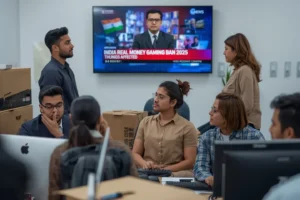India’s selection to ban Online Real Money Gaming in 2025 has caused tremendous debate. The flow, formalized via the merchandising and law of on-line gaming act, is reshaping the digital amusement panorama. From fable sports activities and poker apps to the advertising and marketing enterprise and price gateways, the ripple consequences are widespread. This text explores the key elements of the new law the use of trending queries and examines what it means for companies, players, and regulators.
India real money gaming ban 2025

The Online Real Money Gaming sector in india has grown swiftly during the last decade, developing a multi-billion-rupee enterprise. Systems like dream11, mpl, and rummycircle have become household names, drawing thousands and thousands of customers into fable sports activities, card video games, and other digital competitions.
However, rising concerns approximately addiction, debt, and unlawful making a bet have pushed the government to introduce a blanket ban on Online Real Money Gaming. Under the new regulation, all structures supplying video games with economic stakes—whether talent-based or threat-primarily based—are prohibited. Violations should bring about extreme penalties, together with multi-crore fines and imprisonment.
Enterprise analysts estimate that the ban should disrupt a area valued at over ₹20,000 crore yearly, while additionally forcing a reorientation closer to informal gaming, e-sports, and academic virtual platforms.
Promotion and Regulation of Online Gaming Act 2025
The promotion and regulation of on line gaming act 2025 is the cornerstone of india’s ultra-modern coverage shift.
| Provision | Details |
|---|---|
| Ban | Online real-money gaming fully prohibited. |
| Commission | National Online Gaming Commission set up for regulation. |
| Liability | Advertisers & payment processors held accountable. |
| E-sports | Court action allows non-money e-sports to continue. |
| Enforcement | Extra-territorial rules apply to foreign operators. |
| Penalties | Heavy fines and jail for violators. |
It introduces a strict felony framework governing the net gaming zone.
Key highlights of the act encompass:
- Entire prohibition of Online Real Money Gaming for indian users.
- Status quo of the National Online Gaming Commission, a dedicated body to oversee licensing, regulation, and compliance.
- Clean rules concerning Advertiser and Payment Processor Liability, making sure intermediaries are held responsible.
- Extra-territorial Enforcement provisions, extending the regulation’s reach to overseas corporations targeting indian users.
The regulation makes a pointy distinction between banned money-based totally structures and allowed activities consisting of Court action on e-sports, a good way to preserve to thrive beneath a supportive coverage environment.
Dream11 MPL real money games suspended
The instantaneous impact of the ban has been seen in industry giants.
Dream11, mpl, and numerous different systems have suspended their Online Real Money Gaming offerings. Myth sports, as soon as celebrated as a talent-based activity, now falls beneath the prohibited category.
Dream11 introduced that it’ll pivot towards unfastened-to-play myth leagues and e-sports competitions, at the same time as mpl has shifted assets into informal gaming and talent improvement structures. This modification indicates that at the same time as actual-cash stakes are removed, india’s passion for virtual competition stays robust.
The industry faces a dual mission: keeping user engagement without financial incentives and aligning enterprise models with the pointers of the National Online Gaming Commission.
Penalties online money gaming India

The penalties related to Online Real Money Gaming below the new regulation are designed to behave as robust deterrents.
- First-time violators (structures or individuals) may face up to three years of imprisonment and fines accomplishing ₹1 crore.
- Repeat offenders might be penalized with 5 years in jail and fines of up to ₹2 crore.
- Advertisers and charge intermediaries discovered selling or facilitating banned video games could be fined ₹50 lakh and imprisoned for 2 years.
Here’s a simple short table to Show Penalties in Online Money Gaming India (2025):
| Offense | Penalty |
|---|---|
| First-time violation | Up to 3 years jail + ₹1 crore fine |
| Repeat offense | Up to 5 years jail + ₹2 crore fine |
| Advertisers / Payment intermediaries | 2 years jail + ₹50 lakh fine |
The precept of Advertiser and Payment Processor Liability displays the government’s goal to deal with the surroundings holistically. Via targeting no longer best gaming operators but also folks that permit or sell them, government purpose to close loopholes and make sure complete enforcement.
Impact of gaming ban on jobs and revenues
The financial and employment results of banning Online Real-Money Gaming are profound.

Enterprise bodies estimate the arena employed over 50,000 professionals without delay, with many more indirectly via marketing, fee processing, and occasion management.
| Aspect | Before Ban | After Ban |
|---|---|---|
| Direct Jobs | 50,000+ employed | Large job losses |
| Indirect Jobs | Marketing, payments, events supported | Significant layoffs |
| Tax Revenue | ₹20,000+ crore yearly | Major decline |
| Startups | Fantasy sports & card gaming booming | Many closures/pivots |
| Advertising | Strong ad spending | Sharp reduction |
| Payments | Heavy gaming-linked transactions | Loss of volume, compliance pressure |
The ban may want to bring about tax sales losses exceeding ₹20,000 crore annually, a challenge voiced by using economists and change institutions.
Startups that depended on investment in delusion sports and cash-based card games may shut down, affecting innovation.
On the equal time, the government believes this brief-time period disruption will be balanced by way of lengthy-term gains via more secure virtual gaming ecosystems. E-sports activities, academic games, and casual enjoyment are expected to fill the gap. Courts have already been engaged in Court action on e-sports, clarifying the difference between permissible skill competitions and banned gambling-fashion structures.
E-sports allowed under Indian gaming law
In spite of the regulations on Online Real-Money Gaming, e-sports enjoys authorities backing. Aggressive gaming tournaments without monetary stakes are considered criminal and advocated. This includes nearby and global activities that target virtual abilities, team play, and target market engagement.
The popularity of e-sports as a legitimate career course reflects a shift in how gaming is perceived in india. Universities, sponsors, and even policymakers see it as a manner to sell virtual literacy, teamwork, and financial boom.
The regulation additionally ensures that any Court action on e-sports disputes will be dealt with transparently through the National Online Gaming Commission, ensuring truthful play and readability for players and organizers.
The role of the National Online Gaming Commission
The National Online Gaming Commission is the regulatory authority born out of this rules. Its primary responsibilities include:
- Classifying video games to differentiate between banned and permissible categories.
- Licensing systems that comply with indian regulation.
- Dealing with court cases and disputes, together with Court action on e-sports matters.
- Monitoring compliance with Extra-territorial Enforcement clauses.
This frame represents india’s try to create a centralized, obvious regulator that balances purchaser safety with the need to aid innovation in digital gaming.
Advertiser and Payment Processor Liability
The brand new law places unparalleled obligation on intermediaries. Advertiser and Payment Processor Liability is a crucial element of the regulatory framework.
- Advertising corporations must make certain they’re not selling Online Real-Money Gaming platforms.
- Payment gateways cannot manner transactions connected to prohibited services.
- Sponsors observed assisting unlawful structures might also face crook expenses.
By imposing Advertiser and Payment Processor Liability, the government ensures that the ban isn’t effortlessly bypassed. This holistic method discourages both direct operators and secondary enablers from undertaking prohibited activities.
Extra-territorial Enforcement
One of the most exclusive functions of the act is its Extra-territorial Enforcement provision. On-line systems often operate servers abroad to avoid nearby laws, however the new framework ensures that:
- Any platform targeting indian customers ought to follow the act, regardless of its bodily base.
- The National Online Gaming Commission has authority to dam websites and apps working offshore however available in india.
- Overseas advertisers or payment processors related to Online Real-Money Gaming in india may be penalized.
Here’s a simple short table for Advertiser and Payment Processor Liability (2025 Law):
| Entity | Liability |
|---|---|
| Advertisers | Cannot promote banned online real-money gaming platforms |
| Payment Gateways | Cannot process transactions linked to prohibited gaming |
| Sponsors | Risk penalties if supporting illegal platforms |
| Penalties | Up to ₹50 lakh fine + 2 years jail |
This closes a major loophole in global virtual regulation and aligns india’s policy with global excellent practices.
The future of gaming in India
The ban on Online Real-Money Gaming isn’t the stop of virtual gaming in india however a redirection. Even as a few players can also try to circumvent regulations, the combined impact of Advertiser and Payment Processor Liability, Extra-territorial Enforcement, and strict penalties will make it increasingly difficult.
In the meantime, e-sports activities and informal games are expected to develop. Court action on e-sports will maintain shaping its obstacles, whilst the National Online Gaming Commission will oversee honest and transparent operations.
India is positioning itself not as a country opposed to gaming however as a state devoted to making sure it evolves responsibly.
Conclusion
The Online Real-Money Gaming ban below the promotion and law of on-line gaming act 2025 is a watershed second for india’s digital economic system. It establishes a clean boundary between playing-fashion structures and ability-primarily based digital competitions, prioritizes consumer protection, and introduces strict responsibility for Advertiser and Payment Processor Liability.
With Extra-territorial Enforcement ensuring international compliance and a robust National Online Gaming Commission overseeing the enterprise, india is ready to redefine how gaming integrates into its economic system and tradition.
The transition could be tough, particularly with activity losses and sales worries. However the emergence of e-sports activities, supported by means of legal readability and authorities backing, signals a vibrant destiny. Whether thru Court action on e-sports or progressive law, india’s gaming adventure is a long way from over—it’s absolutely getting into a new technology.
Further Readings:
- Indian Ports Bill 2025: Transforming Maritime Trade
- Delhi’s Best New Fee Regulation Law 2025
- Supreme Court Judgment Transforms Mumbai & Pune Real Estate
- Supreme Court’s Bold Action on Street Dogs: 2025 Ruling law

